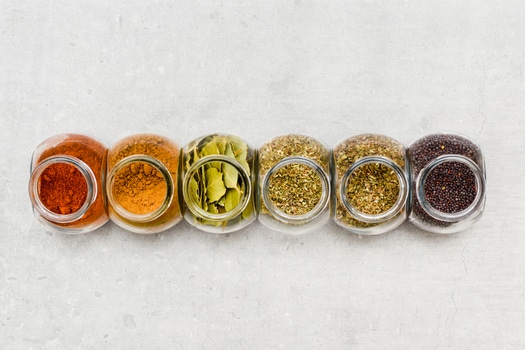
3 anti-inflammatory spices to keep in your pantry
Achy joints, sneezes, a flare up of eczema ŌĆō they can all be caused by.╠²╠²
Inflammation is your bodyŌĆÖs automatic response to help you deal with sickness or injury. When your body becomes inflamed, your inflammatory cells kick into action to fight off the harmful pathogens or viruses.╠²╠²
This is a good thing, when itŌĆÖs temporary, but if inflammation takes up permanent residence in your body, thatŌĆÖs when issues begin and has been found to lead to a .╠²╠²
have been shown to help reduce inflammation. Even something as simple, as adding certain spices can help.╠²╠²
Subscribe to┬ĀWholicious Living┬Āto stay up-to-date with the latest health and nutrition advice.
Humans have been using spices for centuries to add flavour, prevent all kinds of diseases including those linked to inflammation, and restore better health. They are also an excellent way to add flavour without needing to shake on the salt and this will help to .╠²
So which spices do you choose?┬Ā┬Ā
Here are ─¹├╩Ą╝║Į dietitian Jessica FergusonŌĆÖs top 3 spices to help fight inflammation.
Ginger, garlic and turmeric are all expert fighters of inflammation and have been found to significantly lower harmful conditions that may contribute to like diabetes, cancer and heart disease.╠² ┬Ā
Garlic
Belonging to the onion family, is a bulbous plant that originated in central Asia.It was first cultivated over 4,000 years ago making it one of the oldest food flavourings. Garlic has a long history of medicinal use with including increased immunity, reduced duration of a cold and reduced blood pressure.╠² While more research in this area is needed, current evidence suggests garlic may help to reduce and ŌĆō an imbalance between the antioxidants and free radicals in the body, which can damage cells and tissue and in the long term, such as diabetes, cancer and heart disease.
Ginger
Originating in Southeast Asia,┬Āginger comes from the root of the (Zingiber officinale). It has a fragrant peppery, yet sweet flavour and can be used fresh, dried or powdered. People have used ginger for thousands of years in traditional medicine in the treatment of numerous conditions including colds, migraines, nausea, arthritis and high blood pressure. It contains more than 100 active compounds, that are likely responsible for its health effects, including helping reduce inflammation in the body. Specifically, some studies have shown that ginger may help reduce from and after intense exercise. has also found topical ginger ointment may help ease inflammation, with relief found from applying ginger extract to the skin of painful joints.
Turmeric
Widely used throughout the Middle East and Asia to add flavour and colour to dishes, this golden spice is also used in . is root of a plant called Curcuma longa and it is one of the most studied of all spices. Turmeric . One of the most well-known is curcumin ŌĆō an antioxidant with powerful . Curcumin has been shown to help reduce joint pain and inflammation. The problem is the amount of curcumin in turmeric is naturally quite low. Adding some black pepper and healthy fats to a dish with turmeric can help the body better absorb curcumin from turmeric. Many of the on curcumin involve supplements. These have been shown to significantly reduce inflammatory traits, however, it is important to before taking curcumin or turmeric supplements to ensure there are no contraindications with other health conditions or any other medications you may be taking.

The latest nutrition advice, plus health and wellness tips delivered to your inbox monthly

